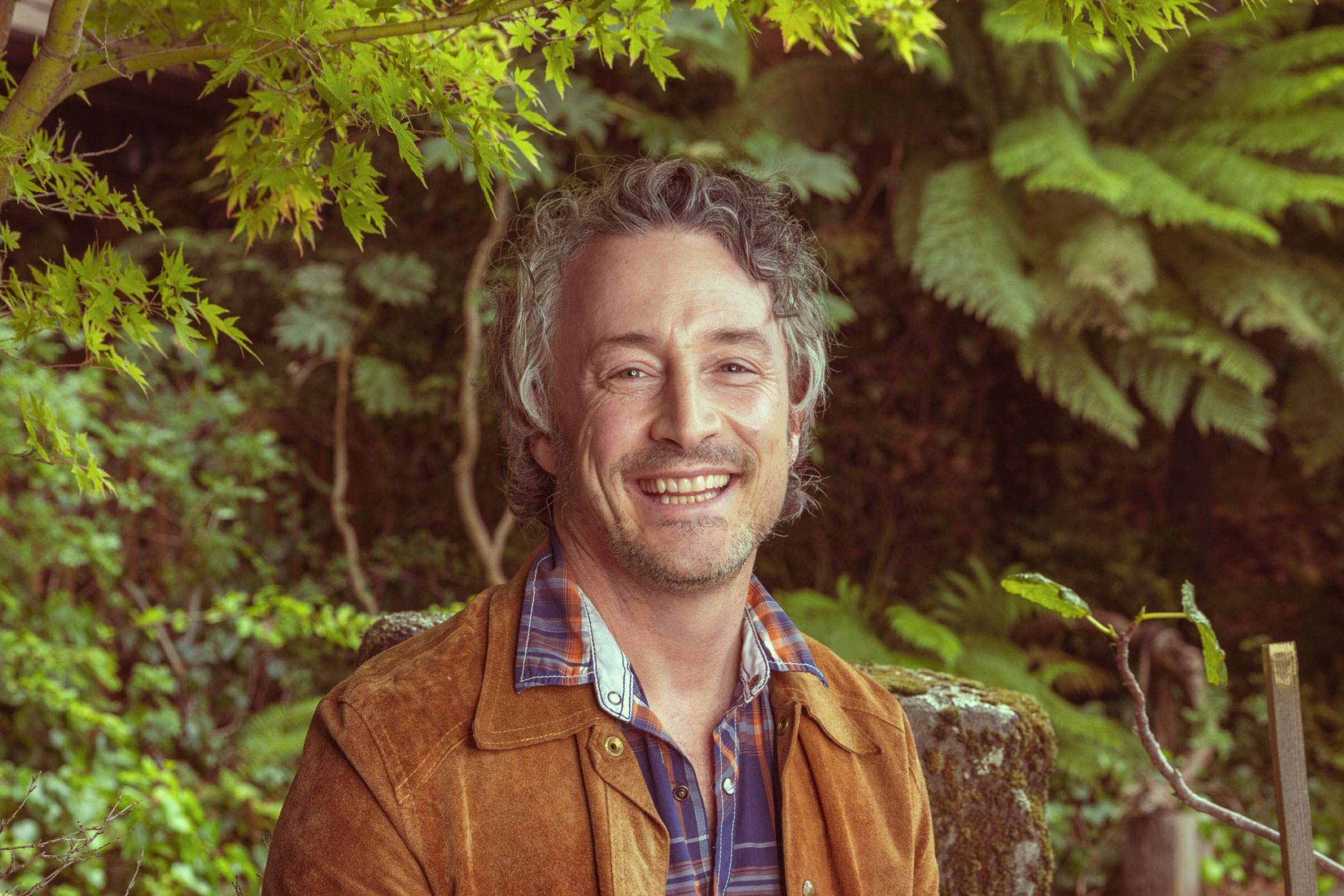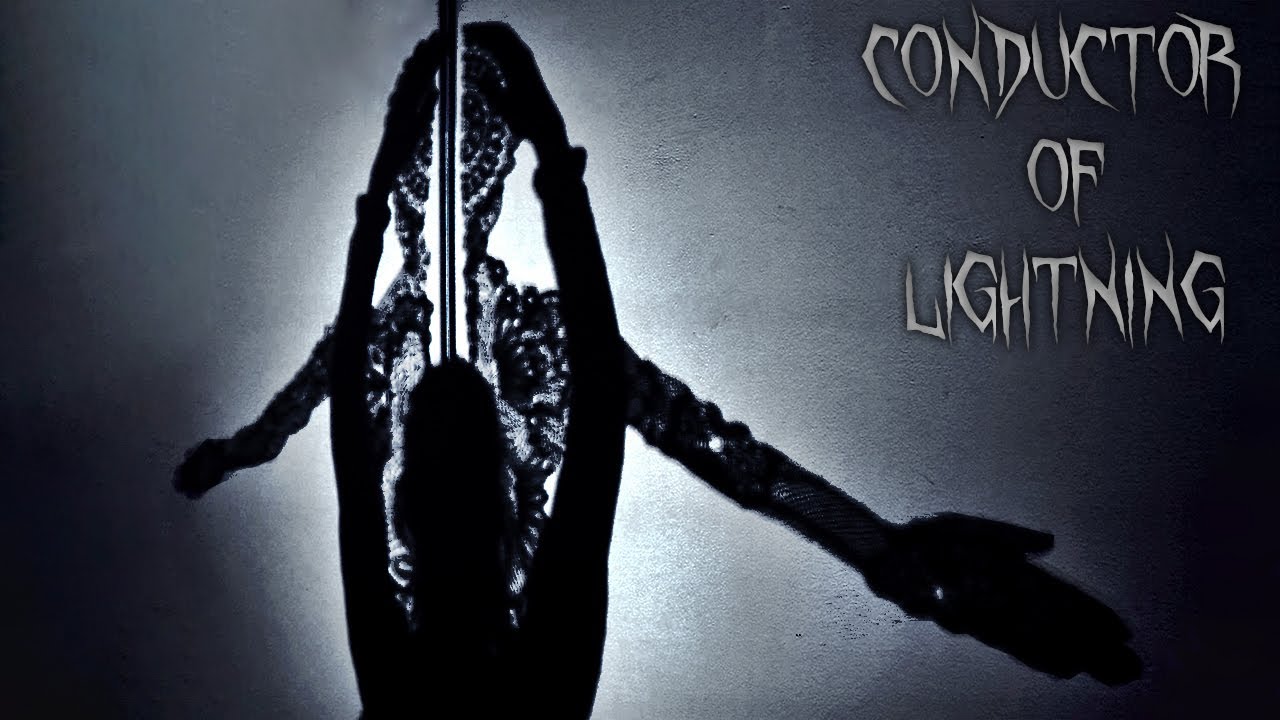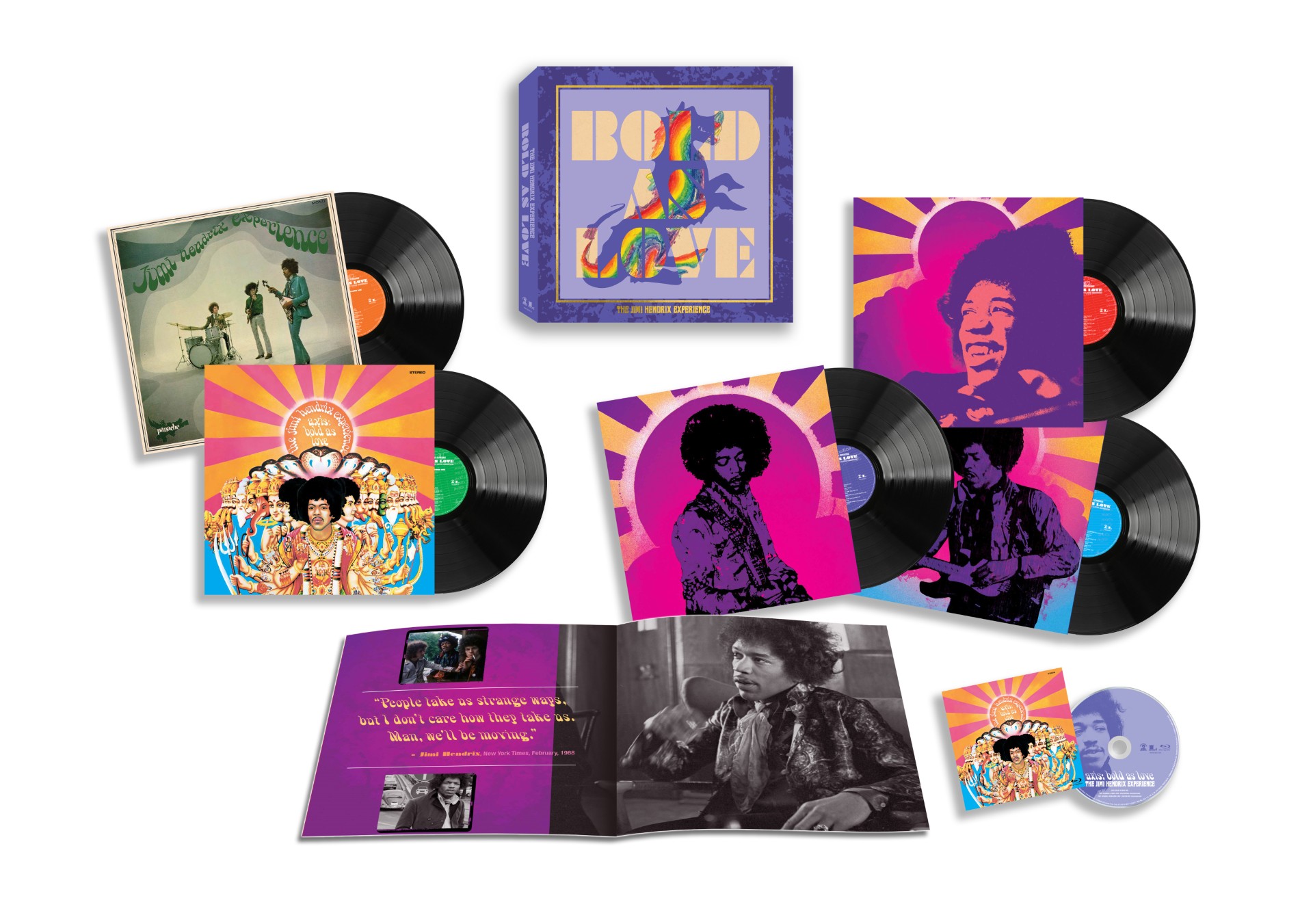Shooting Guns interview with Christopher Laramee, Jim Ginther and Steve Reed
It seems that every time I hear mention of Shooting Guns in any sort of article, the author seems to be arguing with themselves the entire time, utterly unable to decide whether they’re a psychedelic rock or dead ahead metal band; I on the other hand have little use for such classifications.
The only thing that I really know about Shooting Guns is that they come from somewhere in the blindingly cold, white, semi-artic region just the other side of the border known as Canada, and that they’re some amazing musicians! I first became aware, and instantly obsessed, with the band after the release of their 2012 split 7” with Alberta’s Krang, who I talked to not too long ago as a result as well. It’s all been part of a personal mission of sorts I suppose. A mission to prove Canada has a lot more to offer than Rush and Journey; and hey I like Rush, so sue me! Since no one can decide if Shooting Guns are a psych band, a metal band, a rock band or just a really bad ass group of guys that make some amazing tunes they decided, that in defense of their nation and their music they should take some time, even amidst the madness surrounding the release of their upcoming sophomore album Brotherhood Of The Ram, to shoot straight with me, you and the rest of the world! Okay no more bad puns or bad descriptions. Just read the article and listen to some amazing music and if you like ‘em pick up some music!
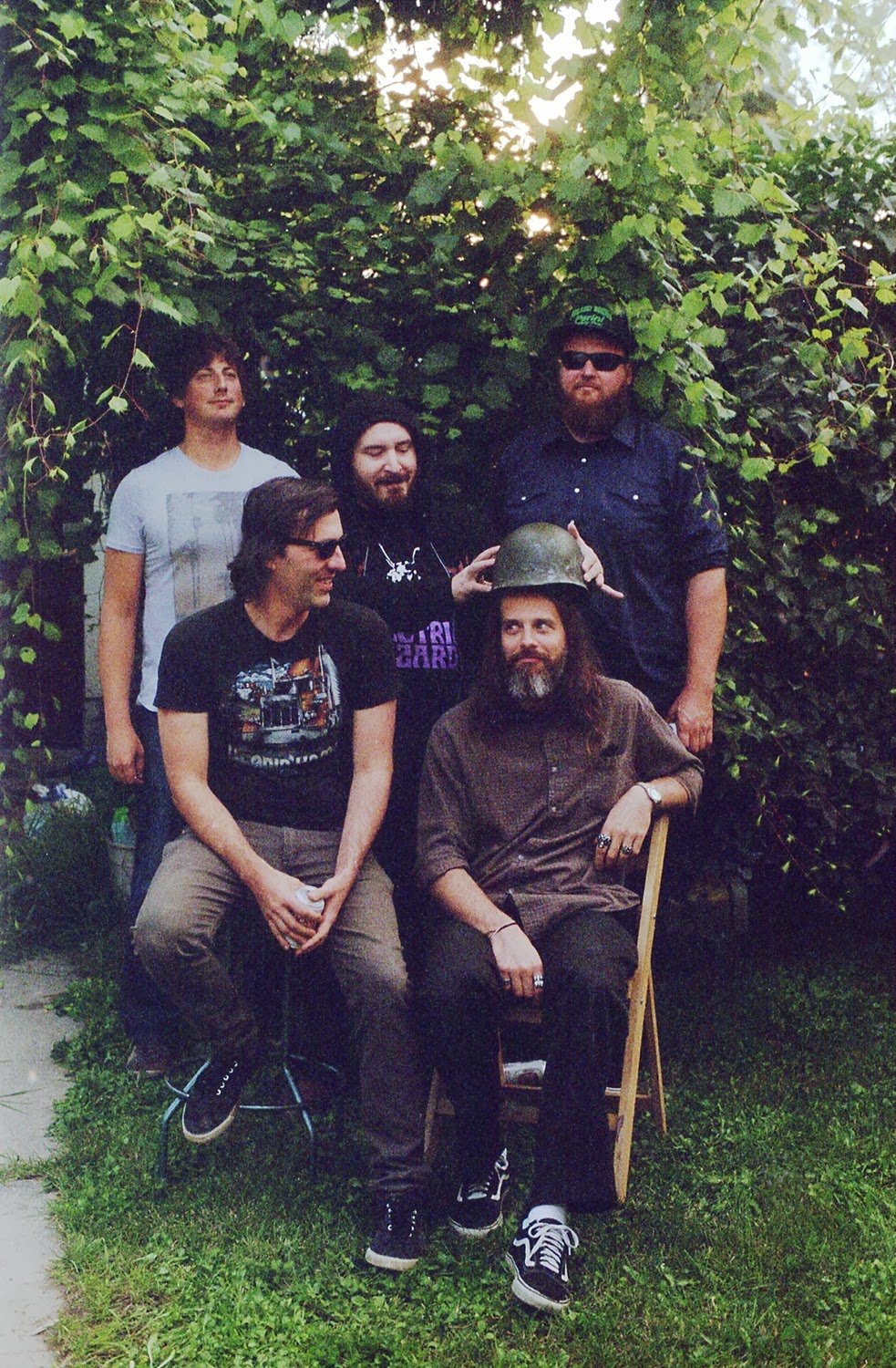
What’s the band’s current lineup? Is this your original lineup or have you gone through some changes over the years?
Laramee: Me and Keef on guitars, Stevie Reed on synth, Jim “Gentleman” Ginther on sticks and kicks and the one and only J Loos on bass and coke bottles, all original lineup.
Are any of you in any other bands at this point? Have you released any music with anytone else? If so can you tell us a little bit about it?
Laramee: I play in Foggy Notions, more of a Phil-Specter-meets-Ride-on-a-hilltop kind of trip, super awesome and a hell of a great group. A new album is forthcoming that’s being mixed by us and Creation records co-founder Joe Foster, crazy, eh? I also got my own more drone-type thing called Wasted Cathedral that’s me and whoever’s around at the time. I got some CD-R’s I’ve burned myself plus a tape out via a great label from Winnipeg called Prairie Fire/Dub Ditch Recordings, fucking swell dudes. They’re putting out a Shooting Guns cassette real soon actually, culled from jam tapes and such. Stoked!
Ginther: Steve and I used to play in an eight-member band called Carbon Dating Service from 2005 to 2009 that travelled across Canada in a 30-foot school bus, Keith used to be in a band called Feedbag in the 90’s and Jay was in Wasabi Labotomy and is also known as DJ Loser.
Where are you originally from?
Laramee: We’re all originally Saskatoon Saskatchewan folks, although a couple of us have lived in various places around the country.
Do you have day jobs?
Laramee: I pick up and deliver furniture for the local Mennonite furniture shop, great people there, it’s a great job. I also work at a local record store, Beaumont Film And Record. I’m an amateur music writer as well for sites like Weird Canada and Perfect Sound Forever, ‘til they find someone better!
Ginther: We all have day jobs to survive but we live to do this.
Was your household musical growing up? Where either of your parents or any of your relatives musicians or extremely interested or involved in music?
Ginther: Not an overly musical household with the exception of the folks cranking Thin Lizzy, Crowded House and Bruce Hornsby.
What was your first real exposure to music?
Ginther: I’m sure other members in the band could give you a more dignified answer but mine was Motley Crüe all the way. I got in around the Dr. Feelgood-era, late to get onboard, but come on! I was only ten and was a super fan. I still remember that February eight is Vince Neil’s birthday. My biggest regret is taking down the 8’ x 8’ collage of ’89-’92 Hit Parader and Circus magazine articles on the Crüe.
When did you decide that you wanted to start making music of you own?
Ginther: It happened pretty much at the same time as I started learning to play drums. Steve and I went to high school together in rural SK and there wasn’t much to do so we learned to make our own fun, whether it was doing donuts in farmers’ fields on our lunch break or getting ripped and then jamming out some horrible songs.
Where is the band currently located?
Laramee: Currently we’re all here in Saskatoon.
How would you describe the local music scene there?
Laramee: Saskatoon’s music scene is pretty rude healthy right now. There’s a lot of great live venues and cool promoters who will book pretty well anything and everything under the sun. Being a smaller center, everyone cross-pollinates and goes to different shows, plays on weird bills and people generally help each other out. Electronic dudes, metal merchants, skids, jangle bands; it all gets thrown together at some point. Local promoters like Jon Vaughn, Brant Palko, Rich Taylor and Skot Hamilton keep the scene alive and thriving by putting local burnouts and malcontents together with touring groups, spreading the love and helping to cement friendships with folks from all over. Without them, there would be no scene here.
Ginther: It’s been all about collaboration and cooperation for the last decade and there’s a “we’re all in it together” vibe for the most part. We don’t really have musicians moving here from bigger cities, there are exceptions but it’s usually people from smaller towns in Saskatchewan that move here, so there isn’t the defensiveness and hostility to newcomers that can exist in bigger places. It’s common for local shows to get better turnouts than touring bands.
Are you very involved with that scene?
Laramee: I personally don’t go out to shows too much anymore, being as I’m an old coot and I like to read at home. But Shooting Guns have benefitted huge from our friends who still seem to come out and check us out when we play our street rock riffs. Hats off to them!
Ginther: Steve and I started a networking collective back in 2001 called Teargas Recording Tree and the idea was to bridge all the pods of musicians into a loose group that could share venues, gear and even members. Once MySpace started in 2005 it pretty much made the idea obsolete since everyone could network on their own and update their own content rather than emailing me website updates every time they had a show. Regardless of how we got here, I’m very happy with how supportive Saskatoon’s music scene is.
Has it played a significant role in the history, sound or evolution of Shooting Guns?
Ginther: We owe everything to how supportive our local scene continues to be but I don’t think that it’s something specific to just Saskatchewan. I’m sure every city’s music scene has great supporters but there’s a level of community in prairie cities that I haven’t seen anywhere else. Winnipeg, Calgary and Edmonton are all much larger cities than Saskatoon but they still have a similar vibe where people really care about good music getting through.
When and how did you all meet?
Laramee: We’ve all known each other for many moons now. I go back twenty years or more with Keef and J, about fifteen with Steve and Jim.
Ginther: Steve and I met when we were twelve in Dalmeny twenty years ago and I met Chris when I moved to Saskatoon in ’99. I met Keith and Jay shortly before the band started so I’m glad I made a good impression!
What led you to form Shooting Guns and when exactly was that?
Laramee: The group just seemed to organically align when Keith came back here from Vancouver a few years back and moved in with J. They had a jam space in the garage, I called Jim by for some beers and smokes, Steve set up his wizard sleeve carpets a bit later and presto. Our first jams were, well, you know that scene in Kubrick’s 2001 when the apes are all going crazy around the monolith in the beginning? Something like that.
Why the name Shooting Guns?
Laramee: I’ll defer to someone else on that. Memory doesn’t serve me.
Ginther: Funny, I thought the name was Chris’ idea! Most of our song titles, much like the band name, come from Chris coming up with a few words that just seem to fit. If there is a meaning to our name, or any of our song titles, it’s lost on me!
I don’t like to classify or quantify music. I think it’s a little beyond simple explanation, how would you describe Shooting Guns music to our readers?
Laramee: Street rock high five psych! Ecstacy in quick time. Grunting dummies spilling drinks and having a great time pushing forwards and backwards forever. We mean it, man, but we’re not going to be subsumed by it, man; if you catch my drift. Bands take themselves a little too seriously these days.
Ginther: Here’s how I describe it to people who can’t get past the fact that there’s no singer: It’s loud like metal but chill enough that the crowd is still 50/50 dudes/ladies. That probably comes across totally the wrong way but hopefully you know what I mean.
From what I’ve read people seem to have a hard time pigeon-holing your sound into one easy to sum up adjective. Do you consider yourselves to be of anyone one genre, or of one genre more than any other? Do you feel the fact that people can’t easily label your music been detrimental or difficult in anyway? No one can really decide if you are a psychedelic band, a rock band or a metal band, and to be fair I can hear all of that and a lot more in your music, but I find it less confusing and more interesting than anything else. Can you talk a little bit about who some of your personal musical influences are? What about the band as a whole rather than individually?
Laramee: I can’t speak for anyone else in the group but I would say genre interests us very little. I mean we’ve been embraced by a lot of people in the metal scene across western Canada but I would never classify us as a metal band. We’re a loud and heavy band, and that’s obviously why we get a lot of love from people who might normally identify themselves as “metal heads”. But they’re also the crowd that I would say are generally the most open-minded about music, up here anyway. Where we’re from lines are very blurred and folks are into a very wide array of vibes and music regardless of genre, fashion or outward appearance. Just don’t call it Indie Rock. Fuck that shit. As for influences, MC5, anything by them really does it for me, big time. Spacemen 3’s not something I’ve ever been able to quite shake, nor would I want to. Coltrane’s classic quartet stuff, I mean, show me a more zoned in bunch of folks and I’ll give you a prize wrapped around your neck. They were the real deal, no doubt. Newer stuff, Carlton Melton rules supreme, Birds Of Maya rip hard, Michigan’s Fuxa drift nice, oh, and I just saw Acid Mother’s Temple at Austin Psych Fest. I know now what standing on the surface of the sun feels like! They destroyed, absolutely. Also, The Verve’s A Storm In Heaven is ninety-percent responsible for the way I play guitar. Nick McCabe is my man. As for the group, we all meet on some Electric Wizard, Circle, Black Sabbath among many other things.
Ginther: I totally agree with Chris. I’ve been using Instrumental Heavy Psych lately but like any other genre classification, it leaves more questions than answers as to how we actually sound. Steve and I cut our teeth on Eric’s Trip and Elevator covers and I think we’re all in agreement about Thin Lizzy, Motorhead and ZZ Top in addition to Chris’ answers as pretty major influences.
Can you tell me about Shooting Guns songwriting process? Is there a lot of jamming and exchange of ideas or does someone come up with the bare bones of a song and bring it to the rest of the band to flesh out and compose?
Laramee: Roman, you nailed it on the head there. The only thing I could add is that Keef and Steve usually arrange the idea and we decide on a tempo. Also, Keef usually comes up with most of the riffs. He’s our overlord.
Reed: Usually Keith, sometimes Chris, will bring a core riff to a jam and we’ll try our best to support it. We repeat it extensively, try out variations, repeat it again, get lost in it, explore options, put it on the backburner for a few weeks, or maybe months, and then dig it out and start jamming all over again.
We try out different structures and arrangements to feel out what the song needs and doesn’t need. We’re guided by intuition much more than intention. Getting lost is a big part of the process.
Ginther: We record almost all of our jams and surprise ourselves months later with what we’ve done. When you don’t come back to it for a while, it’s like hearing it for the first time and really helps pick out what’s working and what isn’t. We released a tape this spring called Spectral Laundromat on Dub Ditch Picnic that was five one-off jams recorded over the winter. I don’t think we ever jammed those riffs again but they turned out better than most stuff that we intentionally record.
Do you all enjoy getting into the studio and recording? As a musician I think almost all of us love the end product, having something real and physical to hold in your hands knowing that you made it, the music is yours. There’s not a lot out there that can beat it. Getting into the studio though, it can be a little bit rough sometimes to say the least. How is it in the studio for you all?
Laramee: I personally love the studio, as long as you’re relaxed and practiced. It should be enjoyable and we’ve been lucky that it has been for us. Let the engineer/ recorder do his thing and you do yours. HAVE FUN!
Ginther: I love the studio but it can also be a very cruel, frustrating mistress. Brotherhood was the first time that we recorded live off the floor direct to analog tape, so there’s no nudging or tweaking, just how we sound and how it was played. Steve and I got into home recording in the early 2000’s and it’s great to have that convenience and the sound was always decent, but there’s something special about recording direct to tape.
Do you do a lot of preparatory work before you heard into the studio and tighten everything down, getting it to sound just the way you want it? Or do you go in with a more open mind and play things more off the cuff and organically?
Ginther: If we had to break the band down into two sections, there would be the rhythm side, Keith, Jay and I and then the melodic side, Chris and Steve. The rhythm side gets everything as tight as possible and those parts rarely change over time, so we record those first and once we get them out of the way then Steve and Chris can work on their parts. Since they’re filling the void of a singer, how Steve and Chris color the songs can give it a completely different feel. We find we work best doing the mixing ourselves and taking time to experiment with variations so we can get the final sound that we want.
Let’s talk about your back catalog a little bit starting with the Dopestrings b/w Harmonic Steppenwolf 7” single from 2010 on Somnambulist Sound System and Teargas Recording Tree. I know it was limited to five-hundred copies but where was that material recorded at? Who recorded it? When was it recorded? What kind of equipment was used in the recording process?
Ginther: We recorded that 7” as well as the Born To Deal In Magic LP (2011) and the Cult of Dom Keller Split 7” (2012) in Steve’s home studio here in Saskatoon. We recorded through some tube preamps directly into his PC. I think Nuendo was the software.
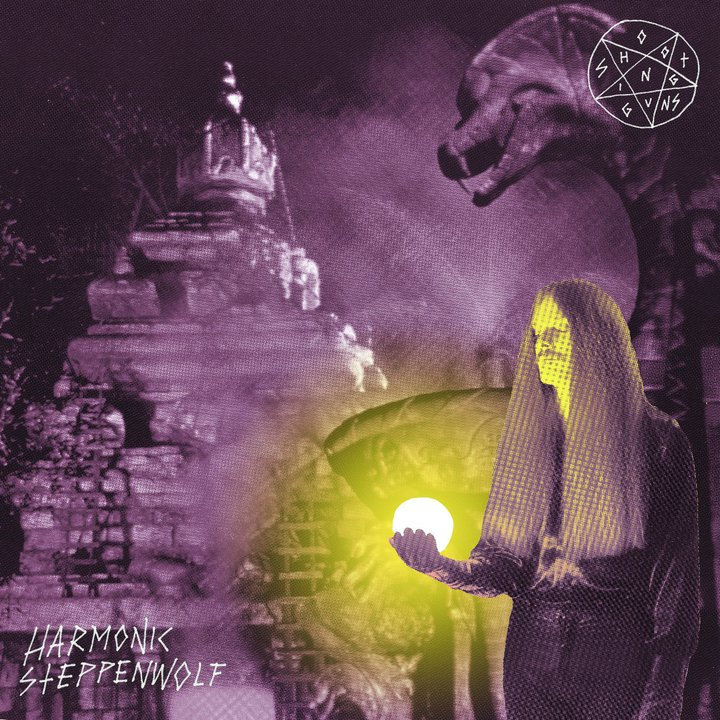
Your first album Born To Deal In Magic: 1952-1976 released the next year and was absolutely amazing. What does the title mean or refer to?
Reed: Chris probably answered that one.
Laramee: Good question. I’m still trying to remember how exactly that came about. A late night bull session, methinks, something to do with the end of rock music and a séance?
Ginther: Refer to my comment about Chris saying something that sounds great and it sticking.
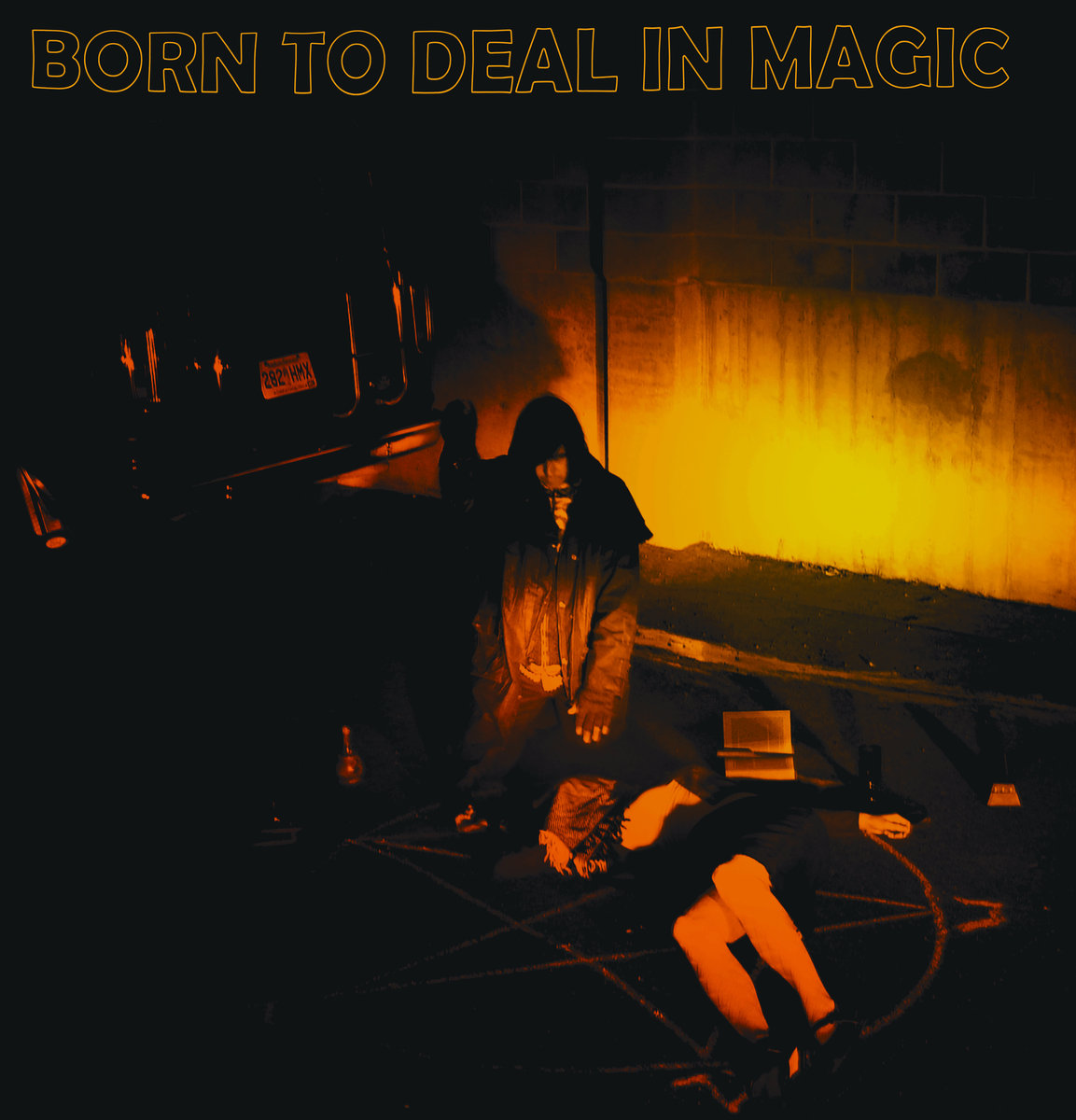
Can you talk a little bit about the recording of Born To Deal In Magic: 1952-1976? When was it recorded? Where was it recorded? Who recorded it? What kind of equipment was used?
Laramee: I’ll defer to Steve on this one as he birthed it.
Reed: We recorded Born to Deal in Magic ourselves to my PC thru a pair of Delta 1010LTs soundcards. Mics were a beat-up B-52 kick mic from an auction, mostly SM57s, some Beta 57s and 58s and a pair of used C-1000s. We used a Joe Meek compressor, a cheap ART tube preamp and one of the worst mixers I’ve ever touched, a noisy Behringer piece of shit that really needs to be scrapped.
The tracks “Dopestrings” and “Harmonic Steppenwolf” had both appeared previously that year on a single together. Are these the same recordings of those songs featured on the LP or were they re-recorded or anything for the full-length?
Ginther: Yes they’re the same songs but the LP versions were mastered differently. We started in 2008 and even though the LP wasn’t ready yet, we wanted to have physical vinyl so we put that 7” out in 2010 while were still recording the rest of the LP. We were debating not putting the B-side Dopestrings on the LP, but we felt that the album was a lot stronger with it in the mix. We came close to selling out of the 7” before the LP came out anyway, so it worked out just as well.
After Born To Deal in Magic you released a split single with The Cult of Dom Keller in 2012. I am working on an interview with them right now and know they are an English band with you are from the great frozen land that is Canada. How did that collaboration originally come about? Who released that single? Was it limited?
Ginther: Chris met them at Austin Psych Fest and hit it off right away. We talked back and forth a bit and Leaning Trees Records from Saskatoon put out a 300 copy pressing of that 7”, with half of the copies staying here and the other half going to the U.K.
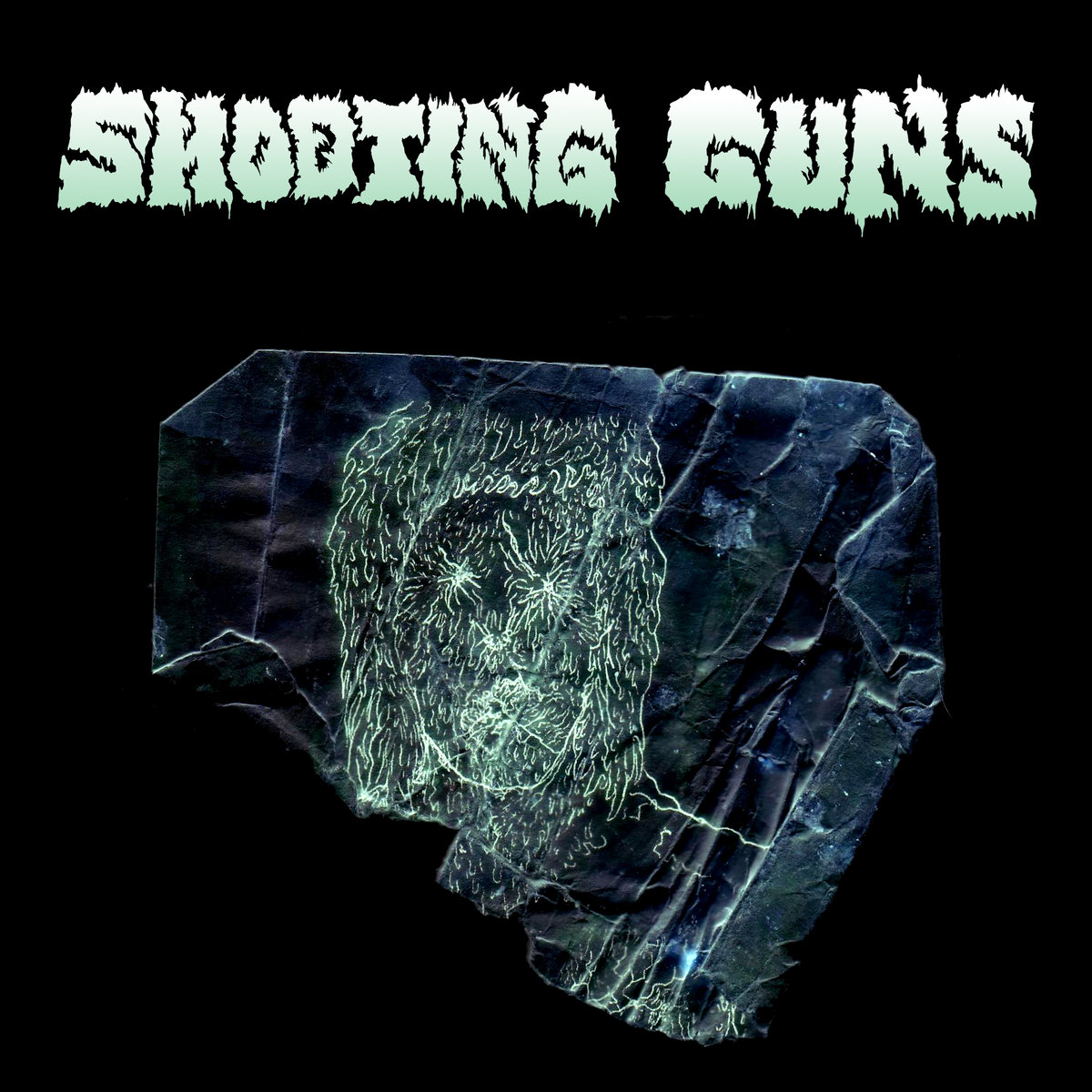
Tell me about the recording of Down And Out In Detroit your track for the Dom Keller split. Was that recorded specifically for this split or was it sitting around somewhere waiting to see the light of day. When was it recorded? Where was it recorded? Who recorded it? What kind of equipment was used?
Ginther: It was recorded in the same exact way as the Born To Deal In Magic LP. It was the first new song that we had ready after the LP was released and this was a great opportunity to get it out there rather than saving it for a future release.
You also released another split single in 2012, this time on Psychic Handshake Records and with Alberta’s own KRANG. This was actually the first release of yours that I picked up; it was love at first sound! How did the collaboration with KRANG come about? You guys are kind of in the similar vein of just rocking the fuck out and doing your own thing but there’s a pretty big difference in the fundamental approaches you take to music, not that I’m complaining otherwise I would have never heard you and I would be one sad man if that were the case whether I knew it or not, ha-ha!
Ginther: We played a show together back when we were just starting and clicked instantly. While our sounds are complementary, we do make pretty different music but we’re coming from the same place. When we get together, whether it be in Saskatoon or Edmonton, it’s just a crazy party and there’s usually someone passed out in the bathroom before the night’s over.
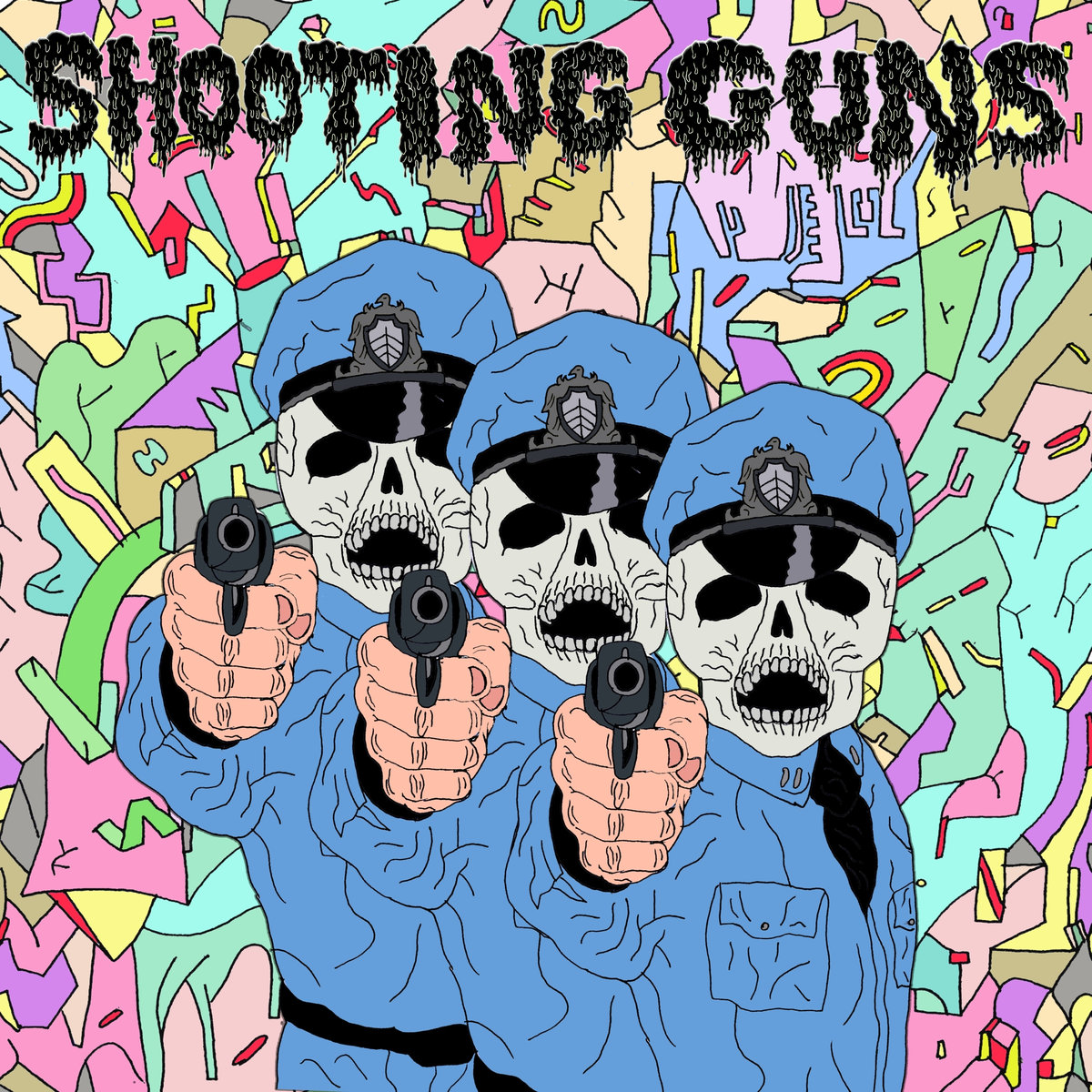
Earlier this year you released a cassette on the insanely cool Dub Ditch Picnic label entitled Spectral Laundromat. I have to ask what the title means, it’s insanely intriguing and I can’t help but conjure images in my mind when I hear the title!
Ginther: Again, that’s just Chris doing what he does best!
Where was the material for Special Laundromat taken from? Was it recorded specifically for the tape or had it been sitting around waiting for the right time and place for a release? When was this material recorded? Who recorded it? Where was it recorded? What kind of equipment was used in the recording?
Ginther: Most of the material was recorded on a 4-track in our rehearsal room with, at most, three mics going. These were all just jams done over the winter, while it was -30 C outside, and when Dub Ditch asked us to do a tape we went through all our jam tapes and pulled out the best ones. Some of the tracks have some pretty raw moments and if you’re looking for errors, especially on my part, they’re there. But there’s also something magical about coming back to a jam lost in time and seeing that there was really something there, no matter how hammered, or whatever we were, when those improv sessions were going down.
You just finished mastering on your second album, Brotherhood Of The Ram and I know that the release date is getting close as you all have gotten test pressings back and approved them at this point. Is there any word on who will be releasing the album or if it will be limited? What about a projected release date?
Ginther: Release is set for October fifteenth and it will be released on Pre-Rock Records, our own label, in Canada and San Francisco, California’s Easy Rider Records is distributing internationally. We funded the initial pressing ourselves and Easy Rider will be distributing one-hundred limited copies on clear vinyl.
You stretched out the lengths of the songs and decreased the number of tunes on Brotherhood Of The Ram slightly from Born To Deal In Magic. What brought about the changes? Can you tell us some of what to expect from the new album? How does Brotherhood Of The Ram differ from Born To Deal In Magic? Was the recording of the new album very different than the recording session(s) for Born To Deal In Magic?
Reed: Yes. We previously handled everything up to mastering on our own using my cheap digital set-up in my basement. This time we hired Chad Mason at Sinewave studio to record us direct-to-tape at his well-equipped analog studio out in UFO country. In three sessions we managed to record the drums and skeleton tracks for all six songs. Chad gave us stem files that we then mixed and overdubbed at my place again. We were a tighter band this time, which helped us make better use of the limited time. I think the limited timeframe also lent a bit of helpful nervous energy to the recordings.
Laramee: There was no real conscious decision for the song lengths other than we had a couple of longer tracks and some quieter stuff that seemed to fit well together. Six songs is just how it came out in the end. As to the difference between this one and the last one, I just think it hangs together a bit better. Hopefully we learn something each time and put that into the album, rather than just hoeing the same row over and over.
What does the title Brotherhood Of The Ram mean?
Ginther: This one actually does have a meaning. Back in the early 90’s the town of Martensville, just north of Saskatoon. Thought that there was a satanic cult operating in a nearby farm and that there was going to be an international satanic gathering. Even the RCMP brought reinforcements thinking there could be a standoff. It turned out to be a total fraud but they thought the name of the cult was Brotherhood of the Ram.
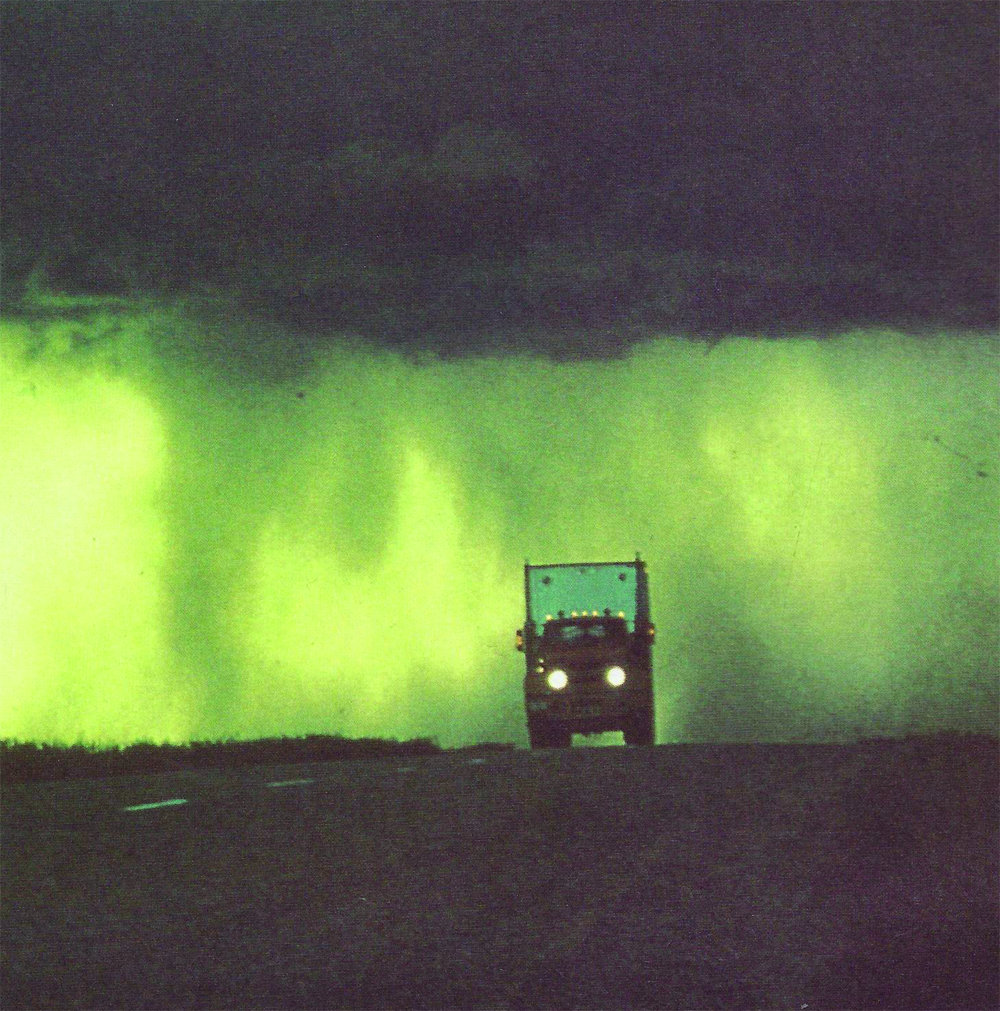
Tell me about the recording for Brotherhood Of The Ram. When was that material recorded? Who recorded it? Where was it recorded? What kind of equipment was used?
Laramee: We went out of town to a buddy of ours’ studio, SINEWAVE STUDIO near Delisle SK. CHAD MASON is his name. He’s got a great tape machine and an amazing live room. We went wandering around the old grain elevator he’s got on his property. I would highly recommend the spot to anyone. The man knows his rock.
Ginther: We recorded the album over three afternoon sessions spanning December 2012 to February 2013.
Has songwriting changed or evolved much since the band began?
Laramee: Not really. It’s pretty much been the same since the first jam; just a process of refinement.
Do you have any other releases apart from Brotherhood Of The Ram planned? Any singles or other cassette EPs for us lucky addicts this year as if a new full-length and a cassette weren’t enough?
Ginther: Brotherhood is our focus for now but we’ve got a lot of new material just waiting to be recorded so hopefully we’ll have more stuff available in early 2014.
Where’s the best place for our U.S. readers to purchase your music?
Ginther: Easy Rider Records for Brotherhood of the Ram and our own Bandcamp page for our earlier recordings and other merch.
With the insane international postage hikes what about our international and overseas readers?
Reed: Bandcamp (for our pre-Brotherhood releases) is easiest, but supporting local shops is always best. If a reader knows of a shop that doesn’t carry our records that we should get in touch with, we’re always interested in making contact with good shops.
Where’s the best place for our readers to keep up on the latest news like upcoming album releases and shows from Shooting Guns?
Ginther: Our official page and we keep all of our sites regularly updated: Facebook, Twitter.
Does, or did, Shooting Guns have, or did you have, any major goals that you’d like to, or perhaps did or didn’t, accomplish this year?
Ginther: I’m always surprised with the opportunities that this band has afforded us. We all look at this as good friends getting together and having the best time that we can. What we’d really like to do next is play overseas in Europe and the U.S. We love touring Canada but it’s so spread out that it’s nearly impossible to break even without grant support. We did a ten-date national-tour in June and drove eight-thousand miles in two weeks. We’ve got some coals in the fire for touring the U.K. and Germany next April and really hope that we can make it happen out there.
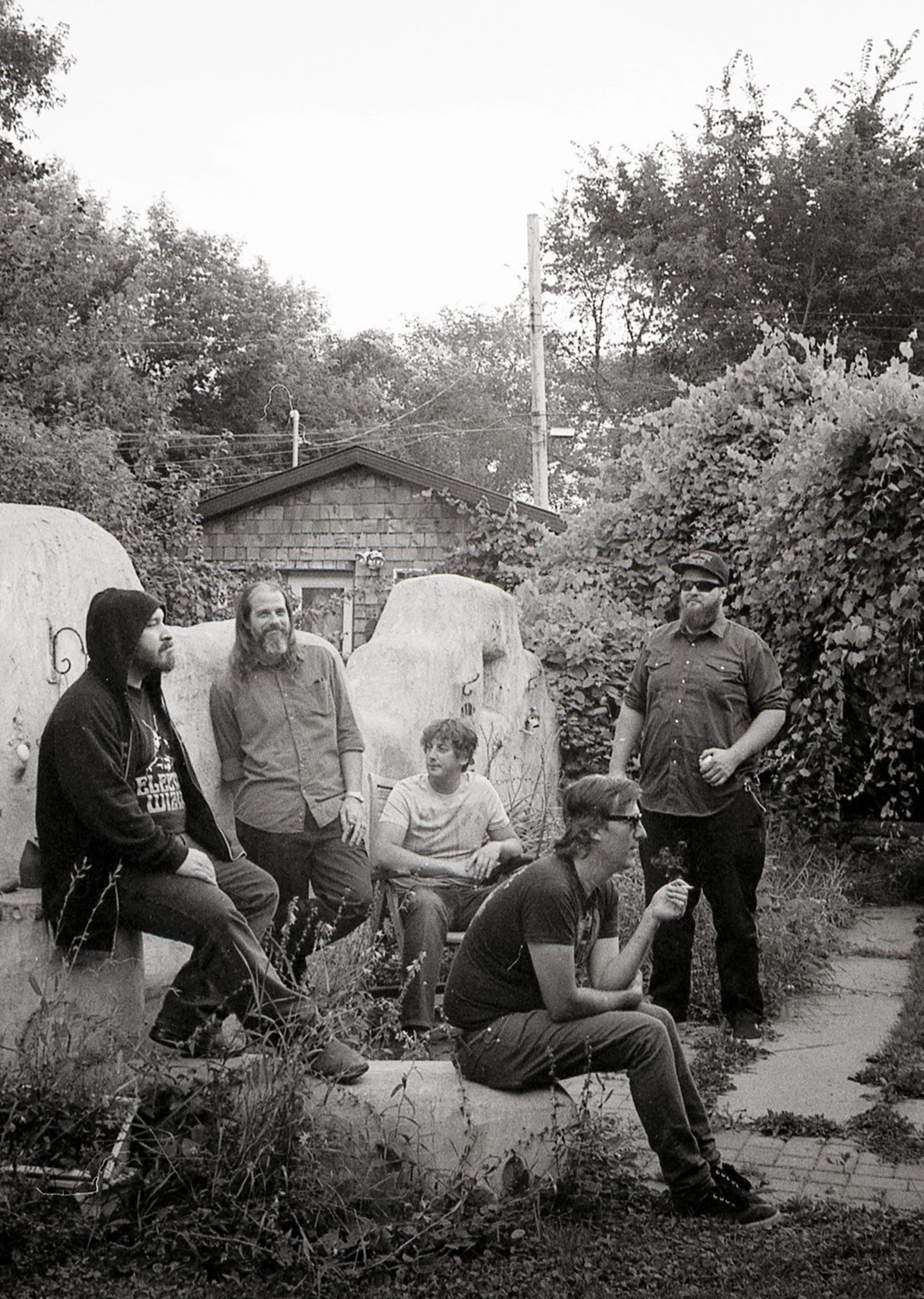
Why do you think that the current psychedelic revival movement is gaining so much momentum and popularity? Do you feel like its gaining momentum or popularity?
Laramee: That’s a hard one. I would say that that impulse, the psychedelic one or whatever name you want to give it, has never gone away. For me, it’s those bands that put out amazing records and throw down intense live shows like White Hills, Carlton Melton, Acid Mother’s Temple, The Heads, The Cult Of Dom Keller, Quest For Fire (R.I.P.), Sleep, OM, The Brian Jonestown Massacre, Purling Hiss, Birds Of Maya, Sun Araw and Neil Young (and that’s a brief list) that keep the fires stoked and glowing. They do what they do, fashion and hipness be damned. Then there are great labels like Sulatron, Rise Above, Sacred Bones, Thrill Jockey and Agitated putting out quality shit and taking chances for little to no financial reward, just because they love the music. Head music will always be around to counteract the shit that we’re constantly inundated with, if for no other reason than losing yourself in some riffs, noise and rhythm for a bit.
Ginther: I think that the trend over the past decade with Indie Rock has produced a lot of music that doesn’t take risks, sounds apologetic, and is fairly predictable. I’m not trying to hate on any bands here, but I’m drawn to the psych scene because the music has more grit than a lot of other stuff out there while still being accessible.
Do guys do a lot of touring? Do you enjoy touring?
Laramee: We do as much as jobs and commitments allow; so not as much as we would ideally like. I enjoy touring to an extent, but I also miss the hell out of my lady Shelby and our three cats. So it’s fun but also a bit of a drag for me. That said, those precious moments when you get to throw down on stage and explode are, when it works, awesome.
Ginther: I love every second on the road with these guys.
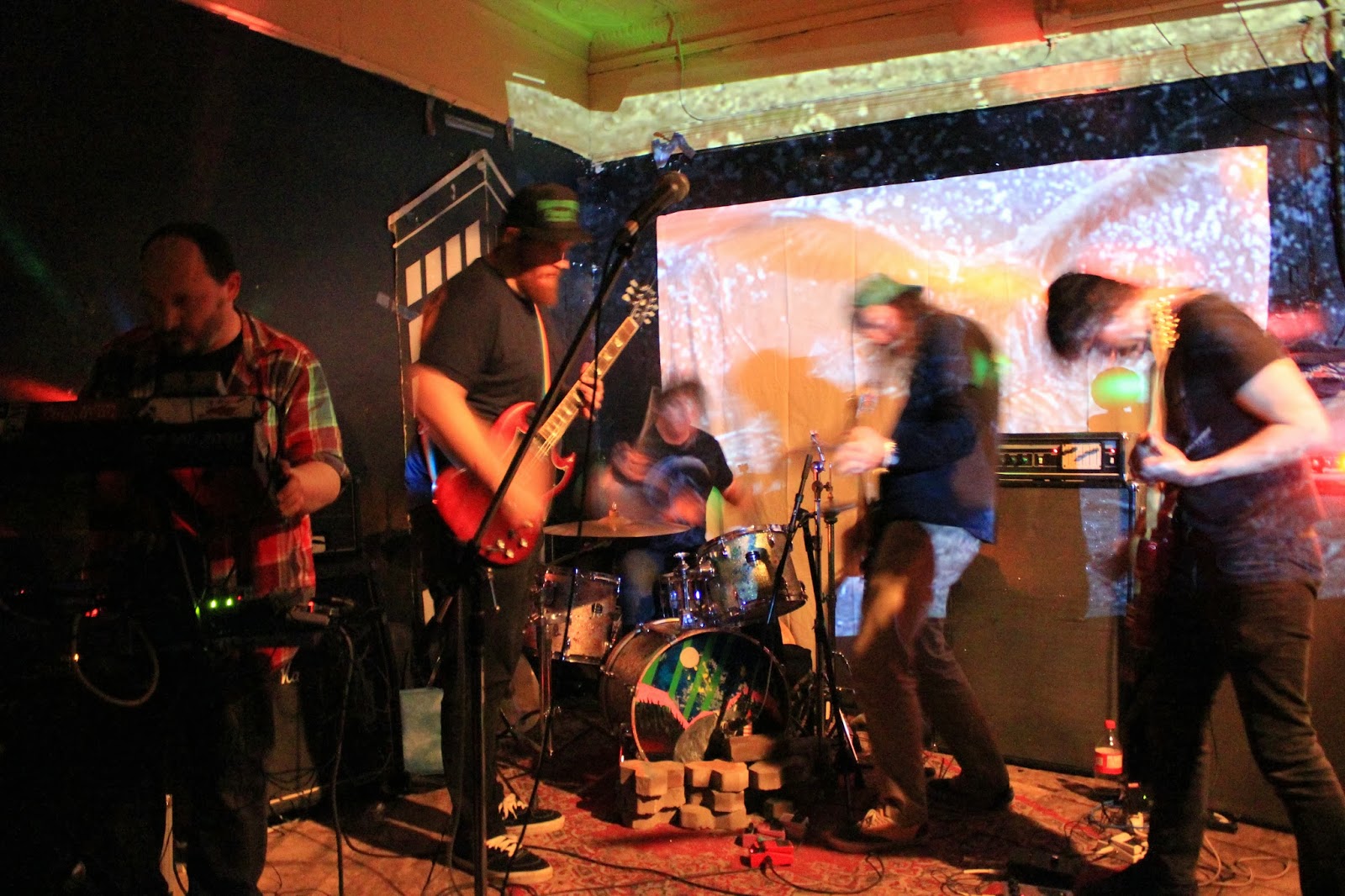
What do you have planned as far as touring goes for the rest of the year?
Ginther: We toured Canada nationally in June and did some one-off shows across the Canadian prairies but there’s nothing else as far as touring goes for 2013. I think the plan for the rest of the year is to go back into the lab and start cranking out some new tunes.
Laramee: We would love to play in the states ASAP. We just gotta be able to afford it and get a chunk of time off work. That said, we are definitely working towards making it happen!
How do you approach playing live? Is there any improvisation?
Ginther: We keep the songs as tight as we can so there’s not much improvisation, at least with the rhythm section. Sometimes we’ll stretch some parts out so that Chris and Steve can make things really swirl, but generally, we approach these songs as hard as we can and ram one song into the next.
Laramee: I just put my head down and go. Get lost for a while. We stretch out some sections of things once in a while but stick to the script for the most part. Personally, that’s something I think we could work on changing, developing more open ended stuff.
You have played some of my absolute favorite bands in the world! I was turned on to you by KRANG who happen to be the one of the best bands I’ve ever heard! Who are some of your personal favorites that you’ve had a chance to share a bill with?
Laramee: That’s a hard one ’cause we’ve been blessed as shit to play with a ton of great bands and great people across the country. Bison BC, Quest For Fire, Shevil, This Hisses, Powder Blue (Shelby’s band), Panopticon Eyelids, Clunt And The Scrunts, The Pach Ad, KRANG, Holy Mount, Black Mastiff plus many others I would love to mention but don’t have the space! Really, dude, we’ve been so lucky playing with great people.
Ginther: Chris’ list is pretty bang on. A few other Canadian bands we’ve played with somewhat recently are Comet Control (ex-Quest For Fire), Hawkeyes (check them out now), Witchstone, Chron Goblin and Mares of Thrace. The last 3 are great bands from Calgary, Alberta.
Do you have any funny or interesting stories from live performances that you’d like to share with our readers?
Laramee: Hmmm. I just ripped off all my strings with a drum stick at our last show with KRANG. More stupid and costly than interesting but there you go.
Ginther: It’s pretty common for people in the front row to start going nuts. More often than not, someone will turn one of the monitors around so they can get blasted in the face with the sound. We’ve had people get so messed up at our shows that they’ve been taken out on a stretcher. I don’t think any fights or anything like that, just people having, possibly too, good of a time.
In your dreams who are you on tour with?
Ginther: White Hills, Circle, Bison BC, Yamantaka, Sonic Titan or Carlton Melton would all be my top choices if ZZ Top wasn’t down.
You’ve released a 12” LP and three 7” singles, with the plethora of choices available to artists today I’m always curious as to why artists select the mediums that they do to release their products. Can you tell us why you’ve chosen to physically release all of your music exclusively on vinyl?
Laramee: We actually have a few discs around and we plan to put some tapes out as well. As I said, format is format. Although ideally we would love to put everything out on vinyl pressing and shipping costs have risen substantially in the last little while, so it’s a bit more difficult now. Difficult but not impossible, you just have to sock away some more cash and wait a bit longer.
Reed: We plan on releasing tapes soon and we’ve released a few things on CD as well. Our fans tend to be most interested in vinyl though, like us.
Ginther: I like vinyl and tapes because people still want them even if they’ve already downloaded the album. We’re finding fewer and fewer people are interested in CDs or would rather just download the album than buy a CD. So we put everything online and then put it out on vinyl and tape for the collectors out there. We’re totally cool with people just downloading our stuff. As long as it gets out there, that’s all we care about.
Obviously you prefer to release your own music on vinyl but do you have a preferred medium when you are buying or purchasing music?
Ginther: We’re all vinyl collectors. I haven’t bought a CD in around ten years and am all about the download and vinyl combination.
Do you have a music collection at all? If so can you tell us a little bit about it?
Ginther: Between all five of us, there’s got to be close to five-thousand. I think there’s about three-thousand in Jay and Keith’s collections alone.
I love having a digital copy of an album to listen to when I’m in the car or whatever, but there’s something almost magical about a physical product to me; something special about holding the album in your hand. Having something to look at and experience while you listen to the music is priceless to me. Do you have any such connection with physical releases?
Reed: Yes. If I’m going to buy or sell something, I want to be able to hold it. I want it to find a home in a pile of other well-loved artifacts. I want it to age and decay. I love the hiss and warble of old tapes, the smell of old crates, the weight of records, the ritual of putting them on. I like hearing songs in their place on an album.
Laramee: I personally love holding something and goofing on the artwork and packaging as well, be it CD, cassette or vinyl. I’m not too much of a stickler for format, though a vinyl copy is always nice. For example, I’d love to buy Electric Moon’s stuff on record but their shit goes out of print so fast it’s hard to get, so I ordered a CD instead. Support Sulatron Records by the way they are an insane label! Also supporting the band is paramount to me.
Digital music has brought serious strife to the music industry to say the least, but on the other hand it’s exposed me to all sorts of music that I’d otherwise absolutely never heard of! What’s your opinion on digital music? What about the rapidly changing face of the music industry?
Laramee: For just being able to connect directly with listeners who otherwise would’ve never been able to check your band out is an absolute positive. Do all these voices thrown into the digital fray increase the quality of music? Of course not. There’s just a whole lot more things to slog through in your search for a cool new band. But without the availability of YouTube for example, I would’ve never found out about groups like Japan’s Overhang Party, hell, a whole lot of obscure Japanese psych music from across the decades. But it’s definitely shaped new habits for listening to bands, new and old. Attention spans are mulched and twitched for sure. Read Simon Reynolds Retromania, most definitely the word thus far on the post everything era we find ourselves embroiled in. He says it far better than I ever could.
Ginther: As a band operating outside of the music industry proper, digital distribution is what has made it possible for a band like ours, from Saskatoon to find fans from all over the world. I’ve heard comparisons of the music industry now to what it was like in the late 40’s when there were all these new formats like TV and radio, etcetera, but no one had figured out how to actually use them effectively. It’s exciting right now because there are so many new options bands have at their disposal, it’s kind of like a free-for-all. We’re trying to keep reaching out and grow within our limits without sacrificing what makes this band so fun to be a part of.
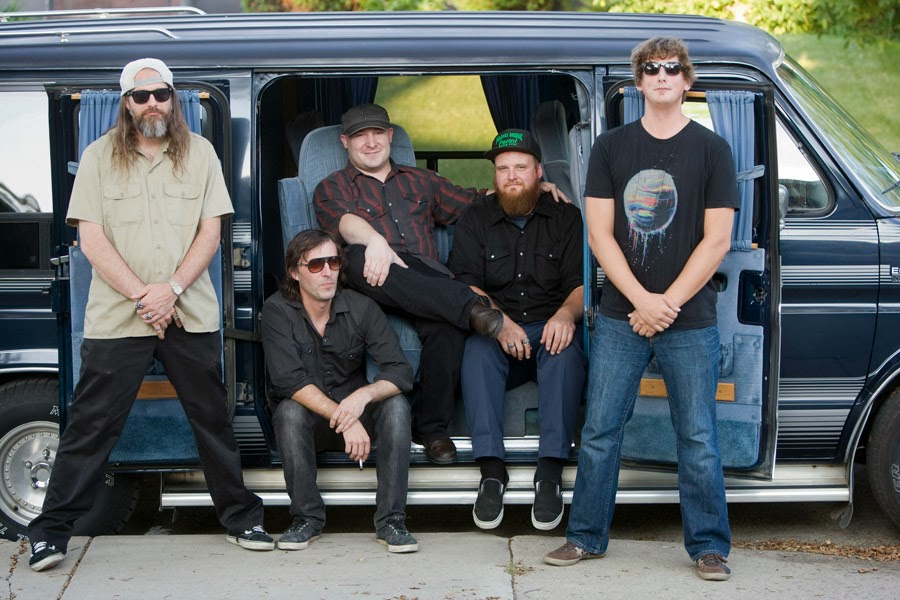
I ask everyone I talk to this question, and try to keep up with as many good acts as possible. Who should our readers be listening to from your local scene or area that they might not have heard of?
Laramee: Okay. Even though I’m one-hundred-percent in love with her and people’ll be like, “you’re just trying to score some points”, Powder Blue rock the shit hard and blare with the best of them. You’ll be hearing more from them soon. The Switching Yard sound like the Seeds mating with Lemmy’s cigarette butts, now if they’d only just put some shit out. As you know KRANG rule infinite, Lavagoat these local doom mongers are an immovable force of nature unto themselves; heavy like a Chevy, brah. My other band Foggy Notions I’m quite partial to, objectivity be damned! Check out The Moas as well for some fine shoegazin’ hellzapoppin’ action. Also The Wizards for some loser surf death and that’s a few of many.
What about nationally and internationally?
Laramee: The Heads, baby! They rule the roost as far as I’m concerned, The Cult Of Dom Keller, and yes we did do a split 7″ with ‘em, hit dark waves of shine like no one else, Hawkeyes from Waterloo Ontario drool infinite, Dead Skeletons out of Iceland were an Austin Psych Fest surprise; they’re really heavenly NEU-ish drone power. The Ketamines are a real after hours yell into a trashcan that shouldn’t be missed and Bardo Pond out of Philly crush my soul with alarming regularity as of late.
Thank you so much for doing the interview is there anything that I missed or that you’d like to talk about?
Laramee: Free your mind and let that ass follow!
– Roman Rathert
DISCOGRAPHY
(2011) Shooting Guns – Dopestring b/w Harmonic Steppenwolf – 7” – Somnambulist Sound System/Teargas Recording Tree (Limited to 500 copies)
(2011) Shooting Guns – Born To Deal In Magic: 1952-1976 – 12” – Teargas Recording Tree
(2012) Shooting Guns/The Cult of Dom Keller – Split – 7” – Leaning Trees Records (Limited to 300 hand-numbered copies)
(2012) Shooting Guns/Krang – Shooting Guns/Krang Split – 7” – Psychic Handshake Recordings (1st pressing of 500 copies)
(2013) Shooting Guns – Brotherhood Of The Ram – ??? – ???

